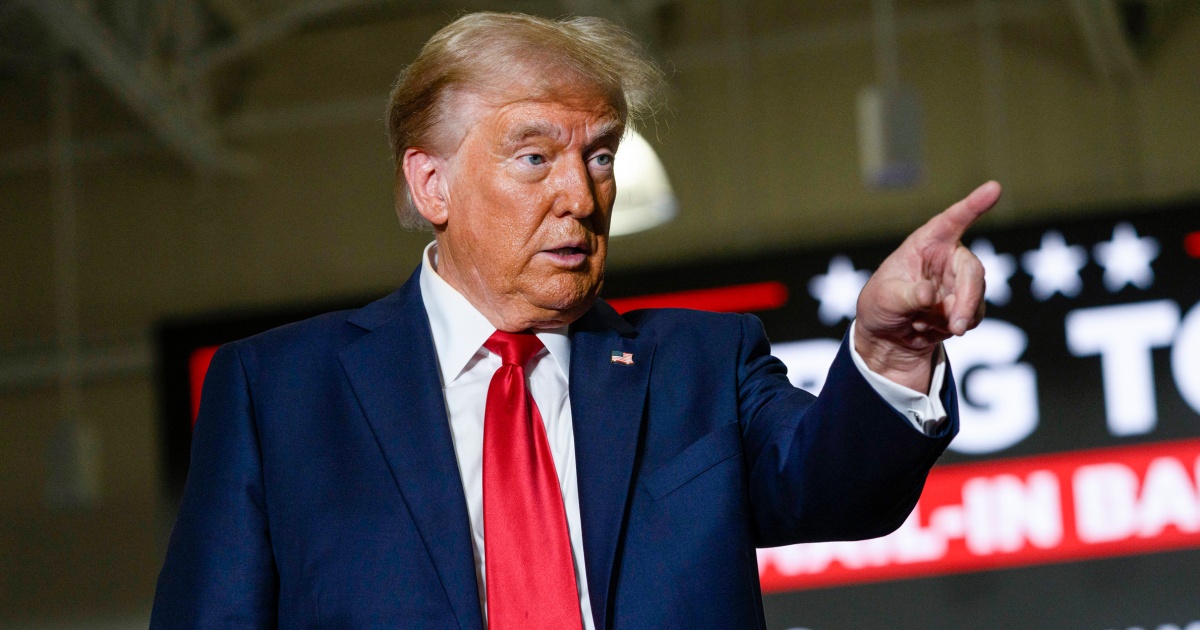Former President Donald Trump held a third rally last month in Erie, Pennsylvania, which sits in the northwest corner of a swing state that could decide who wins the White House.
Like the two other times Trump has been to Erie to rev up his supporters, he left without paying the bill.
City officials haven’t yet tallied up what the Trump campaign owes Erie for public safety costs for his most recent rally in September.
But according to a city official, Trump owes the city more than $40,000 for the rallies he held there in 2018 and 2023.
Erie, whose bills were previously reported by the Erie Times-News, isn’t the only city that has hosted Trump rallies and not been paid by the campaign.
Including Erie, four cities and a county confirmed to NBC News that they’re still waiting for the Trump campaign to pay bills often associated with reimbursements for the costs of local law enforcement and other first responder personnel.
The final price tag is more than $750,000 for those five jurisdictions, with some bills dating back eight years.
At the same time, it’s not always clear cut whose legal responsibility it is to foot the bill.
Reached for comment, a Trump campaign official said in a text message that “questions related to local law enforcement and first responder costs should be directed to secret service.”
At least two municipalities seeking reimbursements said they didn’t have formal agreements with the Trump campaign about costs before the events.
Secret Service spokesperson Anthony Guglielmi told NBC News that it’s the agency, not the campaign, that typically requests local assistance for such campaign activities.
However, the Secret Service “lacks a mechanism to reimburse local governments for their support during protective events,” he said.
Guglielmi added that the agency has “identified this as a critical need” and is working with Congress to make it possible in the future.
Vice President Kamala Harris’ presidential campaign declined to comment on how it handles costs for police and fire department personnel, as well as additional security measures provided by local governments.
The five localities that spoke to NBC News have sent their bills to the Trump campaign. One of the largest unpaid bills comes in at more than half a million dollars.
El Paso, Texas, is seeking more than $569,200 in expenses from 2019, according to an invoice provided by city spokesperson Laura Cruz Acosta. The initial bill for more than $470,000 ballooned when the city charged the campaign a late fee for nonpayment.
In 2020, the El Paso City Council hired a law firm to “advocate in the City’s interest in the collection of the outstanding invoices,” Cruz Acosta said. Four years later, the Trump campaign hasn’t paid.
The unpaid bills go back even further for Spokane, Washington, which wants the Trump campaign to pay for costs incurred in a May 2016 visit, before Trump officially became the Republican nominee for president. That bill amounts to more than $65,000, according to an invoice provided by city spokesperson Erin Hut.
Hut said the Bernie Sanders and Hillary Clinton presidential campaigns also still owe the city money from invoices that were issued in May 2016. The Sanders campaign owes about $33,000, and the Clinton camp owes a little less than $3,000, she said.
Representatives who previously worked with the campaigns didn’t immediately respond to requests for comment.
In Missoula County, Montana, government officials are seeking almost $13,000 for a Trump rally in 2018, according to an invoice the county provided to NBC News. The bulk of the bill — nearly $12,000 — is for police officers and 911 dispatchers, according to the invoice. County spokesperson Allison Franz confirmed that the county didn’t have an agreement with the campaign about the anticipated costs before the event.
In the crucial swing state Arizona, the city of Mesa is still waiting for the campaign to pay local law enforcement around $65,000 for Trump’s visit in October 2018 to Mesa-Gateway Airport, a city spokesperson confirmed.
The bill is for the Mesa Police Department’s work in providing officers for crowd control and traffic control, as well as the department’s rentals for barricades, towing and more, according to a 2018 letter to the campaign from attorney Nancy Sorensen on behalf of the city.
Ana Pereira, a city spokesperson, told NBC News in a statement that when the city “learned about the event and the conditions surrounding the venue, City officials took it upon themselves to implement any measures necessary to keep the public safe without first entering into an agreement with the campaign.”
However, she said that “the City calculated the public safety costs incurred from the campaign event the President attended.”
She said that while the campaign isn’t legally obligated to cover those costs, “[w]e believe the Trump 2020 campaign should reimburse our City for those taxpayer dollars, and we have invoiced the campaign accordingly.”
Similarly, Erie’s bills were to cover police, fire and public works personnel overtime, according to city spokesperson Rob Lee.
Trump addressed overtime pay during his latest Erie stop, just not in the way city officials may have hoped. Instead, he highlighted his no-taxes-on-overtime-pay proposal before he pivoted to his personal views on paying workers.
“I hated to give overtime. I hated it. I’d get other people,” Trump said. “I shouldn’t say this, but I’d get other people in. I wouldn’t pay.”

Leave a Reply